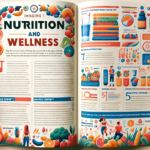Nutrition and Wellness: A Path to a Healthier You
In the quest for a healthier lifestyle, understanding the pivotal roles of nutrition and wellness cannot be overstated. This article delves into the essentials of nourishing your body and mind, ensuring a balanced approach to living well.
The Foundation of Nutrition and Wellness
At its core, nutrition involves consuming the right balance of nutrients to fuel the body, while wellness encapsulates the broader aspects of living a healthy lifestyle, including mental and emotional health. The interconnection between these two concepts forms the backbone of achieving optimal health.
Understanding Nutritional Basics
The journey to wellness begins with the basics:
- Macronutrients (proteins, carbohydrates, fats) are the cornerstone of our energy intake.
- Micronutrients (vitamins and minerals) play critical roles in disease prevention and overall health maintenance.
For a deeper dive into the essentials of a balanced diet, the United States Department of Agriculture (USDA) MyPlate initiative offers a wealth of resources, guiding individuals on how to incorporate these nutrients into their daily meals effectively.
The Role of Diet in Health and Disease Prevention
A well-rounded diet is your first line of defense against many chronic diseases. Consuming a variety of fruits, vegetables, whole grains, and lean proteins can dramatically reduce the risk of conditions such as heart disease, diabetes, and obesity. The Centers for Disease Control and Prevention (CDC) offers comprehensive insights into how dietary choices impact our health, providing valuable guidance for adopting a nutrition-rich lifestyle.
Practical Steps Towards Nutrition and Wellness
Tailoring Nutrition Across Life Stages
Nutritional needs evolve as we journey through life:
- Infants and children require nutrients that support rapid growth.
- Adolescents need balanced diets to fuel their development.
- Adults and older adults should focus on maintaining health and preventing age-related diseases.
Addressing Nutrition in Special Conditions
Life’s unique challenges often call for tailored nutritional strategies:
- Emergency situations demand innovative approaches to maintain dietary intake.
- Specific health conditions may require adjustments to standard dietary recommendations to improve well-being.
Balancing Weight Management and Physical Activity
Achieving and maintaining a healthy weight is a delicate balance between diet and physical activity. Incorporating regular exercise into your routine can magnify the benefits of a balanced diet, enhancing both physical and mental health.
FAQs on Nutrition and Wellness
- What constitutes a balanced diet?
- A balanced diet includes a variety of foods from all major food groups: fruits, vegetables, grains, protein sources, and dairy or alternatives, ensuring an adequate intake of essential nutrients.
- How can I incorporate healthy eating into my lifestyle?
- Begin by gradually adding more whole foods to your diet, planning meals in advance, and being mindful of portion sizes to foster healthy eating habits.
Embarking on a path to better nutrition and wellness is a journey of small, sustainable steps. By focusing on balanced dietary choices and incorporating physical activity, you can significantly enhance your health and quality of life

